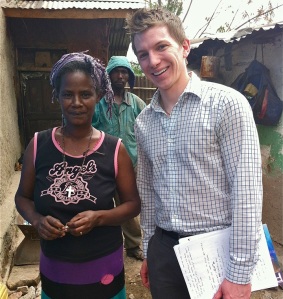Shannon Maynard, Vice President, Chief Talent and Knowledge Officer, Grameen Foundation
On this International Women’s Day, I find myself struggling to celebrate the progress that women have made in all facets of society, while acknowledging that more than 3 billion people in the world – the majority of them women – still live on less than the cost of my morning cup of coffee.
This sobering fact puts into perspective the Marissa Mayer debate on the problems of privilege that I face as a working mother. Flexible work schedules, telecommuting, affordable child care – how about a livelihood, access to a phone, and prenatal health care?
To bring greater awareness to the magnitude of global poverty and the daily struggles that a vast majority of women in the world face, I am taking the $2.50 Challenge along with a growing number of donors, volunteers, and supporters of Grameen Foundation.
Together, we organized online campaigns to encourage our friends to try to live on $2.50 today, or to donate money toward Grameen Foundation’s work to put the same kind of financial and information services that you and I often take for granted into the hands of these poor women.
For many, it’s surprising that the world’s poorest women make far more financial decisions each day than you or I do.
Kenyan Charity Kulola and her seven daughters found themselves homeless after Charity’s husband kicked her out for bearing him no sons. Taken in by her brother, Charity was introduced to Yehu Microfinance Trust and opened a coconut stall with a loan of just $64. With her income, she can now send all seven of her daughters to school.
Imagine being Charity – not having reliable income, facing significant financial shocks caused by poor health without a support structure, and having no access to information on where you might find some help or assistance. What kind of hope is possible for a better future when you are investing all your energy into just making it through the day?
Grameen Foundation, working with a diverse set of strategic partners – from large multinational corporations and government agencies to local social enterprises – is committed to connecting millions of women like Charity to their potential by leveraging their underappreciated strengths and giving them the tools they need, in a business like way. In other words, Charity is not the beneficiary of charity but a customer who now has opportunities and tools to choose from. And with that choice comes a sense of control over her life’s circumstances and hope – hope for herself and a better future for her daughters.
So, on this International Women’s Day, I will raise awareness of the differences in my life circumstances and millions of women like Charity as well as our similarities – our shared hope that our daughters will grow up in a world where they have access to more opportunities than we ourselves have been given.









